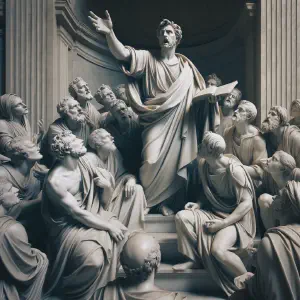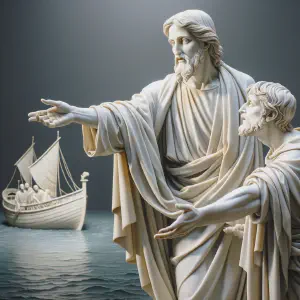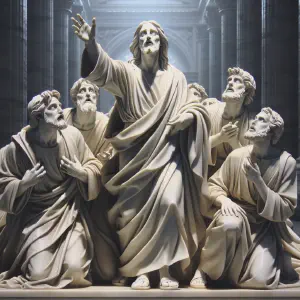The Call of the Faithful



Further along the shore, Jesus encountered James and John, sons of Zebedee, mending their nets in a boat. With the same compelling call, He beckoned them to a higher calling. In an act of immediate obedience and faith, they left their boat and their father, symbolizing a departure from their old life and a commitment to follow Christ into the unknown. In these simple yet profound acts of faith, the early disciples embodied the essence of the good news, setting forth on a path that would echo their faith and dedication to all corners of the world.
Five Questions
What does the phrase “believing in your heart” from Romans 10:9-18 signify in the context of Christian faith?
Believing in one’s heart goes beyond mere intellectual acknowledgment. It’s about a deep, personal conviction that Jesus Christ is Lord and that God raised Him from the dead. This kind of belief is transformative, shaping one’s identity and actions, and is fundamental for salvation in Christian doctrine.
How do these readings bridge the gap between the Old and New Testaments?
These readings beautifully connect the Old and New Testaments. The Psalm, an Old Testament text, speaks of the enduring truth and wisdom of God’s law, which refreshes and enlightens. In the New Testament, this is echoed in the teachings of Christ and His call to the disciples, revealing the continuity of God’s plan for salvation and His unchanging nature.
In what way does the calling of Peter and Andrew by Jesus reflect the broader Christian calling?
The calling of Peter and Andrew by Jesus is emblematic of the Christian calling to follow Christ. Just as they left their nets immediately to follow Him, Christians are called to leave their old lives and attachments to pursue a life in Christ. It’s about a radical transformation and a commitment to a new path led by faith.
Why is the immediate response of James and John to Jesus’ call significant?
The immediate response of James and John highlights the urgency and importance of answering God’s call. In Christian life, this signifies the readiness and willingness to prioritize Christ above all else, including familial and occupational ties. Their response is a model of faith and obedience, demonstrating a heart fully surrendered to God’s will.
How do these scriptures collectively contribute to understanding the nature of Christian discipleship?
These scriptures collectively portray Christian discipleship as a journey of faith, obedience, and transformation. They emphasize the necessity of hearing and believing in the Word of God, the universal nature of Christ’s message of salvation, and the personal call to each believer to actively follow and proclaim Christ. This discipleship is not just about belief but involves a complete life change, mirroring the actions of the first disciples.
Bible Study
Romans 10:9-18
Brothers and sisters:
If you confess with your mouth that Jesus is Lord
and believe in your heart that God raised him from the dead,
you will be saved.
For one believes with the heart and so is justified,
and one confesses with the mouth and so is saved.
The Scripture says,
No one who believes in him will be put to shame.
There is no distinction between Jew and Greek;
the same Lord is Lord of all,
enriching all who call upon him.
For everyone who calls on the name of the Lord will be saved.
But how can they call on him in whom they have not believed?
And how can they believe in him of whom they have not heard?
And how can they hear without someone to preach?
And how can people preach unless they are sent?
As it is written,
How beautiful are the feet of those who bring the good news!
But not everyone has heeded the good news;
for Isaiah says, Lord, who has believed what was heard from us?
Thus faith comes from what is heard,
and what is heard comes through the word of Christ.
But I ask, did they not hear?
Certainly they did; for
Their voice has gone forth to all the earth,
and their words to the ends of the world.
This passage, penned by St. Paul, emphasizes the power of confession and belief in Jesus Christ for salvation. Paul, a pivotal figure in early Christianity, known for his missionary journeys and epistles, highlights the universality of Christ’s salvation, erasing the distinction between Jew and Greek. This aligns with Catholic teachings on the universality of the Church and the inclusivity of God’s grace. The passage also underscores the importance of evangelization, resonating with the Catholic call to preach the Gospel, as delineated in the Catechism and the mission of the Church.
Psalm 19:8-11
R. (10) The judgments of the Lord are true, and all of them are just.
or:
R. (John 6:63) Your words, Lord, are Spirit and life.
The law of the LORD is perfect,
refreshing the soul;
The decree of the LORD is trustworthy,
giving wisdom to the simple.
R. The judgments of the Lord are true, and all of them are just.
or:
R. Your words, Lord, are Spirit and life.
The precepts of the LORD are right,
rejoicing the heart;
The command of the LORD is clear,
enlightening the eye.
R. The judgments of the Lord are true, and all of them are just.
or:
R. Your words, Lord, are Spirit and life.
The fear of the LORD is pure,
enduring forever;
The ordinances of the LORD are true,
all of them just.
R. The judgments of the Lord are true, and all of them are just.
or:
R. Your words, Lord, are Spirit and life.
They are more precious than gold,
than a heap of purest gold;
Sweeter also than syrup
or honey from the comb.
R. The judgments of the Lord are true, and all of them are just.
or:
R. Your words, Lord, are Spirit and life.
Authored by King David, a central Old Testament figure known for his heart after God, this Psalm celebrates the perfection of God’s laws and commands. It reflects Catholic values of reverence for God’s word and the joy and wisdom it brings, as outlined in the Catechism. The Psalm’s emphasis on the truth and justice of God’s laws resonates with the moral teachings of the Church, particularly the Ten Commandments, and highlights the role of divine law in guiding and enlightening believers.
Matthew 4:18-22
As Jesus was walking by the Sea of Galilee, he saw two brothers,
Simon who is called Peter, and his brother Andrew,
casting a net into the sea; they were fishermen.
He said to them,
“Come after me, and I will make you fishers of men.”
At once they left their nets and followed him.
He walked along from there and saw two other brothers,
James, the son of Zebedee, and his brother John.
They were in a boat, with their father Zebedee, mending their nets.
He called them, and immediately they left their boat and their father
and followed him.
This Gospel passage narrates Jesus calling His first disciples, Peter and Andrew, followed by James and John. Jesus, the central figure of Christianity, invites them to a new vocation, symbolizing a transformative call to discipleship. This reflects the Catholic understanding of vocation and the universal call to holiness. The immediate response of the disciples exemplifies total commitment to Christ, a principle echoed in the Catholic teachings on discipleship and obedience to God’s will. Their actions demonstrate the grace of conversion and the willingness to leave everything for the sake of following Christ.
Lessons
The readings present a profound tapestry of faith, illustrating the integral connection between belief, confession, and salvation. They teach us that salvation is accessible to all, transcending cultural and ethnic boundaries, unified under one Lord. The importance of hearing the word of God and the vital role of those sent to preach it is emphasized, reminding us of our collective responsibility to spread the good news. The psalm underscores the value and truth of God’s laws, highlighting their ability to refresh the soul and bring wisdom. Lastly, the calling of the first disciples by Jesus along the Sea of Galilee serves as a timeless example of immediate and unwavering obedience to God’s call, encouraging us to leave behind our old lives and follow Christ with wholehearted dedication. These passages collectively guide us in understanding the essence of Christian faith and the transformative journey of following Jesus.
Meditation Prayer


